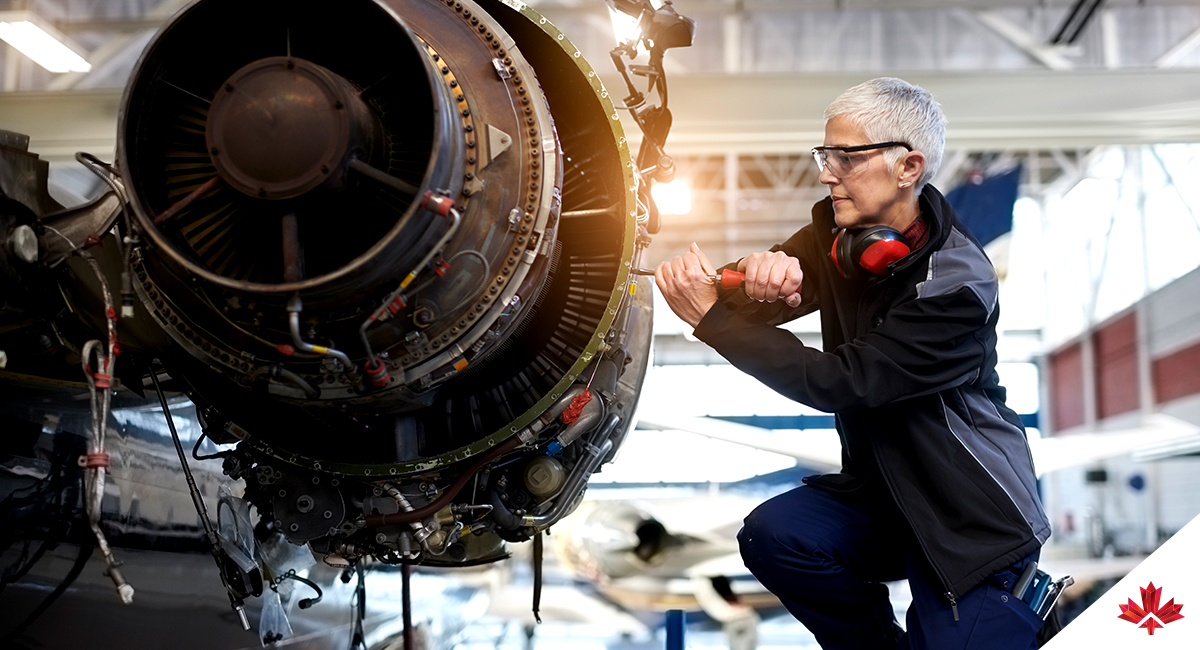Canada’s aerospace industry is among the largest in the world – including being first in flight simulator production, third in engine production and fourth in aircraft production for civil aviation. The industry employs nearly 200,000 people and contributed over $24 billion to Canada’s Gross Domestic Product (GDP) last year. Montréal itself is the world’s third largest aerospace hub after Seattle, Washington and Toulouse, France.
Much of this economic activity, which occurs throughout the country, can be attributed to foreign direct investment (FDI). In the past 15 years, 59 global aerospace companies announced 91 projects in Canada – many of them involving research and development.
Now, with the entire transportation industry undergoing an electric revolution, the aerospace industry is doing its part to contribute to a greener world. Aviation has had a long-term climate plan in place for the last decade and the industry has set an ambitious goal of reaching net-zero carbon emissions by 2050.
The International Aerospace Week 2022, held in Montréal, Québec from September 6-8, provided opportunities for global business leaders to meet and discuss the industry’s sustainability goals.
Desire for positive impact is highest in Canada
In a discussion between Luc Sirois, Quebec’s Chief Innovation Officer of Conseil de l’innovation du Québec, and Benoit Schultz, CEO of Europe-based Airbus, they recognized the 2050 objective is ambitious, but both feel optimistic about reaching it. Their confidence is attributable in part to Canada’s talent and desire to make a positive social impact, which helps create such an enticing place for innovation.
Research shows that from all OECD countries, the desire to have a positive impact on society is higher in Quebec than anywhere else, especially when it comes to social impact and sustainable development.
Luc Sirois, Chief Innovation Officer, Conseil de l’innovation du Québec
In an industry so focused on safety, major shifts cannot always happen as fast as individual companies would like, which is why collaboration is crucial.
FDI has the power to make a difference by bringing global companies with differing expertise to put down roots here in Canada and collaborate with local companies. With aerospace manufacturing being six times more R&D-intensive than the manufacturing average, collaboration among players is key in accelerating speed of innovation. In fact, more than 70% of all Canadian aerospace R&D is carried out in the Greater Montréal area, representing an investment of approximately $700 million a year.
We are a research nation. We will continue to invest in what makes a difference and what seeds elements of innovation.
Luc Sirois, Chief Innovation Officer, Conseil de l’innovation du Québec
Getting to zero emissions in aerospace
Another panel discussion at Aerospace Week focused on the promise of sustainable aviation fuel (SAF), with experts suggesting SAF is the quickest path to decarbonization of the aviation industry. Although the goal of the aviation industry is to reach net-zero carbon emissions within the next few decades, there is a pressing need for an alternative fuel that can bridge the gap between conventional fossil jet fuel and fully electric battery-powered airplanes. The more immediate need is for companies to produce SAF locally, incentivizing production and driving down the cost, as SAF is currently three to five times more expensive than conventional fuel.
With demand for commercial air travel expected to remain extremely high, the development of a more innovation-focused, sustainable aviation ecosystem in the next decade is of vital importance.
Solutions will emerge from a multi-pronged approach in which partners from all over the industry will need to work closely together. A paradigm shift – an alignment toward sustainable alternatives that gets all the players in the aviation and aerospace industry working together – is critical to global projects that will solve this global issue.
This is why Invest in Canada is committed to finding the best global companies to invest here to work with existing companies and introduce further, transformational innovation.
Recently, Ricardo, a UK-based global strategic and engineering consulting company, has announced the opening of an aerospace centre of excellence in Montreal, after having announced earlier this year a partnership with Pratt & Whitney Canada to develop hybrid-electric aerospace technology.
When we find the best to invest, Canadians – and the world – benefit through a more prosperous, more sustainable economy. Learn more about FDI in Canada.
This article was published by: Laura.Stilwell
Visit the original article here



